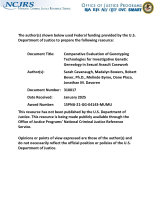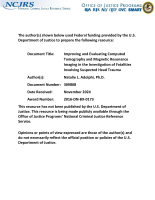Best Practices for Forensic Digital Image Processing
When processing a digital image for scientific analysis and comparison, there are proper procedures that must be followed. This is to ensure the processed image’s admissibility in court and to provide the highest level of clarity and detail possible. Adobe Photoshop provides many tools for processing digital images; however, there are some tools that should not be used in forensic digital image processing.
This webinar was presented by the NIJ Forensic Technology Center of Excellence on August 5, 2021.
See the YouTube Terms of Service and Google Privacy Policy








